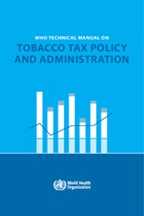Health Promotion
We work to enhance people’s wellbeing and reduce their health risks associated with tobacco use, alcohol consumption and physical inactivity, thereby contributing to better population health. We develop and implement cross-cutting normative, fiscal and legal measures and capacity development tools. We advance global health in health literacy, community engagement strategies and good governance for health, and foster public health action in the settings of every-day life.
Political economy of tobacco taxation
Policymakers seeking to defend, improve or reform their tobacco tax systems are often faced with the political challenge of assembling a sufficiently broad political coalition. The tobacco industry works covertly and overtly to prevent this from happening by using five main SCARE tactics based on a combination of factual inaccuracies and flawed assumptions:
- Smuggling and illicit trade fearmongering if tobacco taxes are raised despite evidence shows that the presence of illicit trade is more a function of weak governance such as corruption, weak regulation, poor tax administration and insufficient deterrence of criminal activity.
- Court and legal challenge threats that are usually baseless are tobacco taxation measures are well-established compared to other tobacco control demand reduction measures and particularly legally defensible. As a result, the tobacco industry actions involve legal threats or exploiting procedural vulnerabilities to stifle implementation of reform.
- Anti-poor rhetoric that omits the reality that it is the poor that are already harmed the most by tobacco use in terms of their health status, and thus benefit disproportionately from the health impact reduced tobacco use. The poor can also benefit more if the tax revenues from tobacco are allocated to ‘pro-poor’ programmes like health and education.
- Revenue reduction arguments that are contradicted by evidence across the world that large and regular tobacco tax increases result in large and consistent revenue increases.
- Employment mythmaking that exaggerates the number, quality and irreplaceability of tobacco sector jobs. Even in those countries that lead in tobacco growing and manufacturing globally, the tobacco sector is still only a relatively insignificant and declining source of jobs that are typically lower-paid and poorer quality.
Publications

Featured publication | 12 April 2021
WHO technical manual on tobacco tax policy and administration
This manual provides practical guidance on tobacco taxation policy and administration to help governments achieve their health, revenue and equity objectives.
Related links
